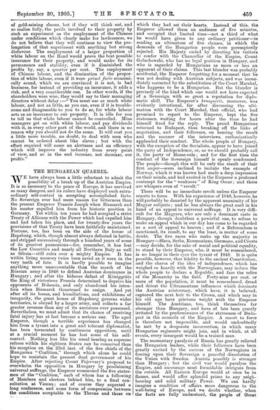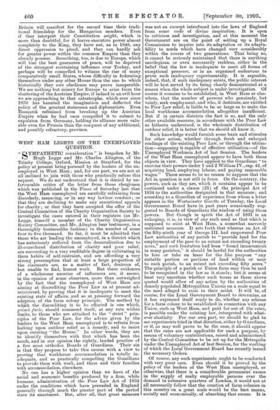W E have always been a little reluctant to admit the
possibility of a break up of the Austrian Empire. It is so necessary to the peace of Europe, it has survived so many dangers, and its rulers have displayed such extra- ordinary self-control in accepting accomplished facts. No Sovereign ever had more reason for bitterness than the present Emperor Francis Joseph when Bismarck and his master expelled him from his historic position in Germany. Yet within ten years he had accepted a strict Treaty of Alliance with the Power which had expelled him and had taken his place, and for twenty-five years the provisions of that Treaty have been faithfully maintained. Fortune, too, has been on the side of the house of Hapsburg, which, though almost always defeated in battle, and stripped successively through a hundred years of some of its greatest possessions—for, remember, it has lost the Low Countries and nearly all Northern Italy as well as Silesia—still rules over a mighty Empire. It has within living memory twice been saved as it were in the very teeth of fate. It is hardly possible to imagine anything more unaccountable than the march of the Russian army in 1848 to defend Austrian dominance in Hungary ; and after the hideous defeat of Koniggratz the King of victorious Prussia determined to deprive his opponents of Bohemia, and only abandoned his inten- tion when Bismarck threatened to resign. And yet after all its losses, and humiliations, and exhibitions of incapacity, the great house of Hapsburg governs wider territories, is obeyed by a larger army, and collects a far greater revenue than any of its ancestors ever possessed. Nevertheless, we must admit that its chance of receiving fatal injury has at last become a serious one. The aged Emperor, though a terrible experience has changed him from a tyrant into a great and tolerant diplomatist, has been tormented by continuous opposition, until at a crucial moment he has lost some of his self- control. Nothing less like his usual bearing as supreme referee within his eighteen States can be conceived than his reception on the 23rd inst. of the five chiefs of the Hungarian "Coalition," through which alone he could hope to maintain the present dual government of his Empire. After rejecting Count Fejervary's proposal to overwhelm the opposition in Hungary by proclaiming Universal suffrage, the Emperor summoned the five states- men of the " Coalition," each of whom has a following of Members and electors behind him, to a final con- sultation at Vienna ; and of course they expected a long conference, and some form of compromise between the conditions acceptable to the Throne and those on which they had set their hearts. Instead of this, the Emperor allowed them an audience of five minutes, and occupied that limited time—not a third of what he would have given to any ordinary petitioner—in reading an ultimatum of five clauses, in which the demands of the Hungarian people were peremptorily rejected. His Majesty ended by directing his visitors to confer with the Chancellor of the Empire, Count Goluchowski, who has no legal position in Hungary, and who is regarded by Hungarians as more or less an opponent of their claims. This last blunder was probably accidental, the Emperor forgetting for a moment that he was not dealing with Austrian subjects, and was imme- diately corrected by the substitution of the Court Marshal, who happens to be a Hungarian. But the blunder is precisely of the kind which one would not have expected of a Sovereign with so great a reputation for diplo- matic skill. The Emperor's brusguerie, moreover, was evidently intentional, for after discussing the ulti- matum with the Court Marshal, that official, who had promised to report to the Emperor, kept the five statesmen waiting for hours after the time he had himself fixed for the reply. The proud Hungarians returned to Budapest, thus breaking off the links of negotiation, and their followers, on hearing the result and the manner of the interviews, enthusiastically applauded their conduct. The whole people of Hungary, with the exception of the Socialists, appear to havejoined the party of Independence, or, as we should probably call it, the party of Home-rule ; and for the first time the conduct of the Sovereign himself is openly condemned. The people—though this will be only the result of their first anger—seem inclined to imitate the example of Norway, which it was known had made a deep impression on their minds, and had excited in the Emperor a profound contempt for the " weakness " of King Oscar; and there are whispers even of " revolt."
There will be no immediate revolt unless the Emperor resorts to force. With his experience of 1848, however, he will probably be daunted by the apparent unanimity of his Magyar subjects ; and he has always the great card in his hand of an appeal to universal suffrage. It is very diffi- cult for the Magyars, who are only a dominant caste in Hungary, though doubtless a powerful one, to refuse to make an appeal which in our day has come to be regarded as a sort of appeal to heaven ; and if a Referendum is sanctioned, its result, to say the least, is matter of some doubt. The five races who make up the majority in Hungary—Slays, Serbs, Roumanians, Germans, and Croats —may decide, for the sake of social and political equality, to stand by their Emperor, who, it must be remembered, is no longer in their eyes the tyrant of 1848. It is quite possible, however, that fidelity to the ancient Constitution, and the charm of the idea of independence, which has weighed so heavily with the Norwegians, may induce the whole people to declare a Republic, and face the relics of the Monarchy in the field. Forty-nine per cent. or more of the population, it must be remembered, dread and detest the Ultramontane influences which dominate the Austrian aristocracy, which have, it is believed, captured the next heir to the Crown, and which may in his old age have grievous weight with the Emperor himself. The Austrians, too, think themselves far stronger than Hungary, and have of late been greatly irritated by the predominance of the statesmen of Buda- pest in the councils of the Empire. A. resort to force is therefore not impossible, and would undoubtedly be met by a desperate insurrection, in which many Hungarian regiments might join, and in which, at all events, every insurgent would be a trained man.
The momentary paralysis of Russia has greatly relieved the Hungarian leaders, while their followers have been greatly excited by the success of the Norwegians in forcing upon their Sovereign a peaceful dissolution of the Union with Sweden. Austria possibly is stronger than Hungary ; but the civil war would paralyse the Empire, and encourage most formidable intrigues from the outside. All Eastern Europe would at once be in flames, and would offer splendid prizes to any neigh- bouring bouring and. solid military Power. We can hardly imagine a condition of affairs more dangerous to the well-being of Europe, and we doubt whether, when the facts are fully understood, the people of Great • Britain will manifest for the second time their tradi- tional friendship for the Hungarian seceders. Even if they interpret their Constitution aright, which is more than doubtful, for it leaves executive power almost completely to the Sing, they have not, as in 1848, any direct oppression to plead, and they can hardly ask for greater power within the common Empire than they already possess. Something, too, is due to Europe, which will lose the best guarantee of peace, will be deprived of the strongest restraining influence over Turkey, and perhaps will be compelled to witness the rise of many comparatively small States, whose difficulty in federating themselves under any other House than the one to which historically they owe obedience may prove insuperable. We see nothing but misery for Europe to arise from the shattering of the Austrian Empire, if indeed in an evil hour we are approaching to that catastrophe, which ever since 1870 has haunted the imagination and deflected the policy of the greatest statesmen and diplomatists. Even Bismarck refrained from breaking up the Austrian Empire when ho had once compelled it to submit to expulsion from Germany, holding its alliance more valu- able even for Prussia than the conquest of any additional, and possibly refractory, province.











































 Previous page
Previous page